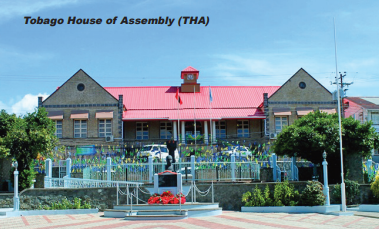T&T a Genuine Kakistocracy
- SunshineNewsTT

- Apr 18, 2019
- 5 min read
FINANCE BY DAVID WALKER ACCOUNTANT & DATABASE EXPERT
It is sometimes said that “a picture is worth a thousand words”. It is an English language idiom which refers to the notion that a complex idea can be conveyed with just a single picture, this picture conveying its meaning or essence more effectively than a description does. We can all recall instances which prove this to be true.
Occasionally however, one encounters a word which manages to describe a thing or an event so succinctly and so accurately that no picture is necessary. In fact, the word itself conjures up precisely the image that is intended. I recently encountered just such a word. It is kakistocracy. At first is sounded like something that we in Trinidad and Tobago might invent. I could just hear it coming out of the mouth of one of the many literary geniuses that frequent our bars and whose use and abuse of the English language gives rise to much merriment.
We are a kakistocracy in every sense of the word
I regret to inform you that the word was coined elsewhere and we can take no credit for it. Fascinated as I was to trace its origins and meaning I undertook a little research and discovered, according to Wikipedia, that “the word was coined as early as the seventeenth century. It also was used by English author Thomas Love Peacock in 1829, but gained significant use in the first decades of the twenty-first century to criticize populist governments emerging in different democracies around the world”. As to its meaning, Wikipedia tells us that kakistocracy “is a system of government that is run by the worst, least qualified or most unscrupulous citizens”. I am suggesting to you my friends that there could hardly be a word better suited to describing the state of governance in Trinidad and Tobago today. We are a kakistocracy in every sense of the word. When one looks at the fruits of our massive public expenditure over several decades it is difficult to fashion an argument that we are not indeed a kakistocracy. Twelve billion dollars spent by Petrotrin with nothing to show, roads in permanent disrepair, water once a week in some areas tell the tale. Following the vein of thought about the nature of our governance, one is inclined to view ourselves also as a kleptocracy. Kleptocracies are generally seen as associated with governments in which external oversight is impossible or does not exist. This lack of oversight can be caused or exacerbated by the ability of the kleptocratic officials to control both the supply of public funds and the means of disbursement for those funds. Think of UDECOTT, Petrotrin (again) WASA and the unauditable THA.
A state can be both a kakistocracy and a kleptocracy
In truth, a state can be both a kakistocracy and a kleptocracy. One would intuitively expect the incompetence of a kakistocracy to facilitate the corruption of the kleptocracy. The two support and enable each other as I discussed in a previous column. We now have a name for the malaise that has infected the body politic in T&T. The obvious question that then arises is “how do we move away from being a kakistocracy?”, as surely, we should not wish to continue in such a state. Knowing what ails you is the first step towards recovery. The remedial action that must be taken is not always so obvious. That is especially so in our situation where the illness has been present for decades and the rest of the body has grown used to functioning under its influence. Many citizens know no other standard of governance and accept it as normal. Parts of the body will instinctively react negatively to any attempt to change the nature of our governance. There must also be a realisation that persons who benefit from such a state are by definition unable to earn commensurate rewards outside of such a system. Such persons, (kakistocrats) are therefore more resolute than competent, honest individuals in their determination to retain power and to hold the nation in a state of kakistocracy. Our best, brightest and most honest are able to thrive outside of that bubble and do not exhibit the same determination to remain “in the saddle” as the miscreants. We therefore need to find the means to dislodge the incompetent and corrupt within the system and to replace them with competent, honest leaders. I see two possible routes to achieve that objective, both of which could be applied. The first is political and requires the wholesale replacement of the dominant political parties (or their leadership) who have been at the helm for eons. The other is to pursue the corrupt through the courts so that they pay a heavy price for their misdeeds and are both discredited and removed from public office.
Our kakistocrats will not easily be moved
“Easier said than done”, I hear you say and you are correct. Our kakistocrats will not easily be moved both because of the tremendous stakes in play and also because we as a people do not have a tradition of standing up to our elected (and appointed) leaders when they deviate from the standards that we expect. This is especially so given the tribal nature of our politics where our kakistocrats can rely on the support of their tribe. The politics and governance of Trinidad and Tobago must change if we are to make best use of our bountiful resources. My conversations with “people in the street” have changed markedly over the past few years. I now sense a new will among the electorate, a will that may just offer a glimmer of hope. My other source of hope is the relentless work of those who I call our anti-corruption warriors. Such selfless efforts have enabled us to understand and expose the blatantly corrupt nature of many procurement instances in recent years. Prosecution of the culprits in even one major case would have a profound effect on the brazen activities of others. I see only the ballot box and the courts as the means by which to remedy our current condition. Other brighter folks may have different or even better ideas. I am not a political analyst but I am looking at the financial and other external symptoms of a kakistocracy and believe that we must use any and all tools at our disposal to effect the change that we need. I will certainly continue my analyses and commentary on the many very clear instances of corrupt practice. I hope that others can lead the charge in removing our kakistocrats from power.





![Clico... A victim of corrupt actions.. by connected parties [Part 5]](https://static.wixstatic.com/media/a27d24_b686ab99a7034581931b0f5fd224247c~mv2.png/v1/fill/w_417,h_288,al_c,q_85,enc_avif,quality_auto/a27d24_b686ab99a7034581931b0f5fd224247c~mv2.png)


Comments